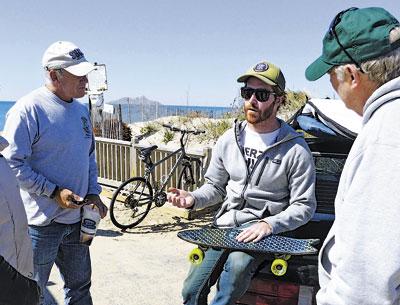From Ghost Nets to Skateboards

Turn used fishing nets into skateboards. An idea that would have seemed utopian green only a few years ago is being brought to fruition by three surfers with engineering degrees and a shared goal of ridding the ocean of plastic pollution, ghost nets in particular.
The ghosts in question are drift, or dragged, nets that continue to snag fish and marine mammals long after they are either lost or dumped at sea. A campaign to fund the first production run is now in progress through Kickstarter.com.
It all began in 2011 when Kevin Ahearn Jr. of Montauk and East Hampton, David Stover of Block Island, and Ben Kneppers, a Cape Cod native, met up in Sydney, Australia.
Mr. Ahearn was there at the tail end of a 10-month, around-the-world backpacking trip he undertook after leaving a job with a small engineering firm in Greenport. He subsequently joined the Boeing company in Huntington Beach, Calif., for two years before launching head-on into the net-to-skateboard metamorphosis.
He and Mr. Stover graduated from Lehigh University in 2007 with engineering degrees, Mr. Stover with a concentration in finance. Mr. Kneppers, graduated from Northeastern University with a degree in sustainability. He moved to Chile two years ago to help with government efforts in his field.
“We are all surfers, grew up on the beach, me here, Dave on Block Island, Ben on Cape Cod. Dave Stover was living in Indonesia for a while, and I was in Southern California, and were aware of the problem of ghost nets and plastic pollution,” Mr. Ahearn said during an interview at Ditch Plain Beach in Montauk on Monday.
“The juices started flowing in Australia, the seed of the idea. We agreed we had the skill sets to do something about ocean pollution. We realized the potential of our collaborative careers at that time, but it was over the next two years that we started putting the pieces together and really making things happen,” Mr. Ahearn said.
Mr. Kneppers had learned that discarded fishing nets had become a serious problem in Chile. The country did not have the money or the infrastructure to deal with it. Mr. Ahearn explained that Chilean fishermen used nets made of nylon that typically wore out in about six months.
“They have to pay to dump the nets in private landfills, and as a result manyare cut loose at sea. Ten percent of the plastic pollution found in the world’s oceans takes the form of fishing gear, dangerous for marine mammals and the ecosystem,” Mr. Ahearn said.
“We started talking to the World Wildlife Fund in Chile. They advised us. By this time last year we realized we had something tangible,” he said, that being a continuous supply of material that was almost all nylon, collection points for fishermen to leave their nets, and trucking companies — already hauling fish and supplying the fishing industry — willing to take the nets to Santiago, the nation’s capitol. They named their company Bureo Inc., “bureo” being the word for wave in the Mapuche language of Chile’s indigenous people.
The three amigos traveled to Boston to pick the brains of engineers who worked with plastics in order to develop a process for recycling the nets. They brought the process back to Santiago where a plastics manufacturer, one of South America’s leading recycling companies, had the machinery and liked the idea. The nets would be cleaned, melted down, and turned into pellets for storage — “We call them skateboard sperm,” Mr. Ahearn said. From there, the pellets would be melted again, and injected into a one-ton, steel mold, “like a big waffle iron,” that produces the skateboard blanks.
Mr. Ahearn said products made from fishing nets are not limited to skateboards alone.
“Midsummer of 2013, we all moved to Chile and spent six months turning our computer models to work,” he said. The surfing engineers got a leg up from the Chilean government’s Start-up Chile program designed specifically to attract global entrepreneurs. “They gave us $40,000, a place to live, and a place to work.”
As he explained the short history of his endeavor on Monday, a group of Ditch Plain regulars listened intently while inspecting and approving of a fish-shaped prototype of the skateboard.
Once the skateboard blanks are finished in Chile, they will be sent to the Satori Wheels company in California. Satori will supply the “trucks,” as the wheel and axel hardware are known. “Their wheels are 30-percent vegetable based instead of petroleum-based urethane.” At first, the skateboards will be sold through the company’s website, bureoskateboards.com, then through shops “that speak to our message,” Mr. Ahearn said, that being green and sustainable.
Bureo’s goal is to raise at least $25,000 to pay for the first production run to test the market. “By donating to Kickstarter you are rewarded with a skateboard,” Mr. Ahearn said, adding that while the goal was close to being met, “we want people to know that for every additional dollar, we will be able to return to Chile and expand the program faster and make a bigger impact.”
Those interested in helping with the endeavor can go to Kickstarter.com and search for Bureo.
